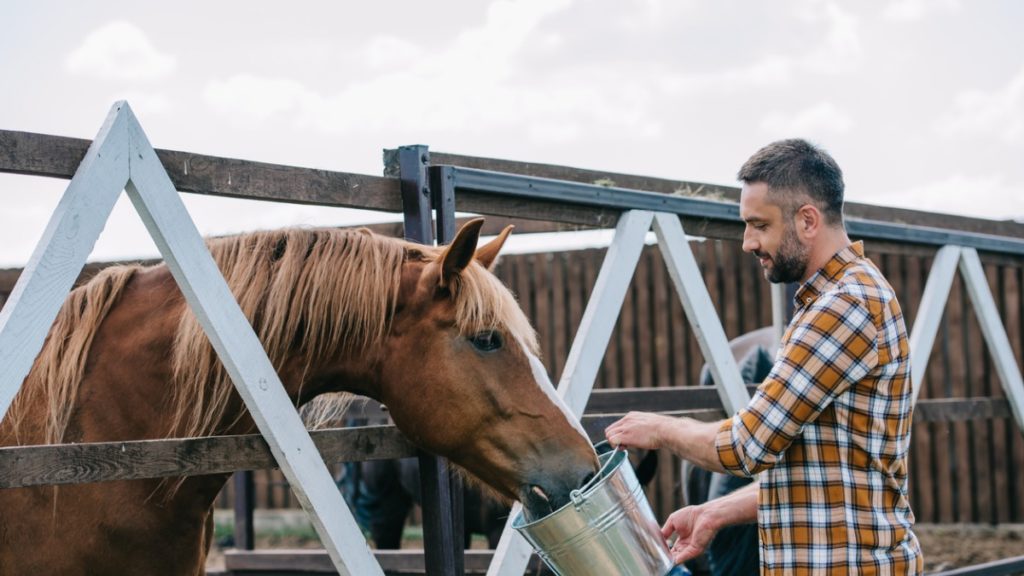As a horse owner, you’re always striving to take the best possible care of your horse. With that comes seemingly endless things to learn and decisions to be made, including what to feed him.
A healthy diet is based on good forage—hay and/or pasture. Beyond that, you can feed him grain or other bagged concentrate to add calories to the diet.
Once you’re happy with your horse’s base diet, you probably will start to think about horse supplements. It seems like every horse in the barn is on a regimen of supplements, so they must be important, right?
Read on to learn about some of the most common types of horse supplements and if some might be right for your horse.
1
Vitamin/Mineral Supplements
If your horse is fed a commercially formulated grain or concentrate (be sure to feed per label instructions), it already should be enriched with vitamins and minerals. If your horse does not eat a commercial concentrate but grazes on fresh grass, he should be getting all the vitamins he needs.
If he only eats hay, however, your horse might benefit from supplemental vitamins, as these are lost during hay curing and storage. Some vitamins and minerals can cause toxicity if overfed, so compare labels on all feed and supplements to ensure you’re not overdoing it with any one ingredient.
2
Joint Supplements
Whether you have an older horse who is starting to show the effects of osteoarthritis or a younger, active horse whose joints could use some protection, horse hip and joint supplements may be right for him. There are many formulations to choose from, so you may want to try one for 30 days and watch for noticeable improvements.
Ingredients for joint care in horses can include glucosamine, chondroitin sulfate, hyaluronic acid, MSM, ASU, yucca, devil’s claw, vitamin C, ester C, collagen and silica.
3
Hoof Care Supplements
One of the more popular categories of horse supplements among horse supplies is hoof health. Horses with brittle, shelly feet that tend to chip and lose shoes might benefit from hoof care horse supplements.
These can help make up for dietary deficiencies that lead to poor feet. But you’ll have to use them for about 6-12 months while the hoof grows out before a noticeable improvement can be seen. Ingredients vary, but may include biotin, lysine, methionine, threonine, zinc, copper, cobalt, MSM, and omega 3 and 6 fatty acids.
4
Weight Gain Supplements
If you feed your horse plenty of high-quality forage but he’s still a hard keeper—which means he has difficulty gaining weight—and your vet has given him a clean bill of health, you might want to consider a weight-building supplement. These most often are formulated with high fat content to provide extremely concentrated calories.
Common ingredients include vegetable fats, amino acids, rice bran and flax meal.
5
Skin and Coat Supplements
Because feeding fats also leads to a glossy coat, horse skin and coat supplements often overlap with weight-building supplements—just fed in smaller amounts. Ingredients can include rice bran, flax seed, chia seed, soybean meal, amino acids, zinc, vitamin E, biotin and yeast.
6
Gastric Support Supplements
When it comes to gastric ulcers in horses, a common health problem plaguing domesticated equines, an ounce of prevention truly is worth a pound of cure. In addition to management changes, such as decreasing stress, increasing turnout time and providing forage 24/7, there are many horse supplements designed to protect against gastric ulcers.
Gastric supplements can include antacids, soluble fiber, L-glutamine, collagen, aloe, sea buckthorn and licorice.
7
Digestive Support Supplements
If your horse is prone to colic, which is severe abdominal pain, you might be interested in trying a digestive support supplement. As with ulcers, management changes, such as limiting stress, increasing turnout and forage availability, are the first line of defense.
If you decide to add a digestive supplement, these often include a combination of probiotics (live, beneficial gut bacteria), yeast or oligosaccharides that encourage the growth of healthy gut bacteria, and digestive enzymes.
8
Calming Supplements
Whether at shows or at home, some horses tend to be easily spooked or high-strung. Assuming your horse is getting enough exercise to work off excess energy, you may want to consider horse calming supplements.
Calming supplements contain ingredients that target the nervous system, such as vitamin B1, magnesium and L-tryptophan. Herbal remedies are commonly included, such as valerian, chamomile and hops.
9
Supplements for Seniors
As horses continue to lead longer and healthier lives, with productive years stretching into their 20s and even 30s, you might find yourself looking for a supplement formulated specifically for the senior horse. These can provide an all-in-one formula to address joint health, a strong immune system, good weight and digestive support.
Check labels carefully to make sure the ingredients address your particular senior horse’s needs and don’t overlap with other supplements you’re already feeding. Keep in mind that some show associations do blood testing for a list of banned substances, possibly including herbal supplements.
Look for products from reputable manufacturers, such as those that have received the seal of approval from the National Animal Supplement Council (NASC). Supplements with this seal provide assurance that your horse is getting the active ingredients in the amounts listed on the label.
Armed with more knowledge about horse supplements and what they do, you will have a much better idea of what to buy. If you remain unsure, talk to your vet about your horse’s particular health concerns and needs.
Learn more about horse health:
Share:




























